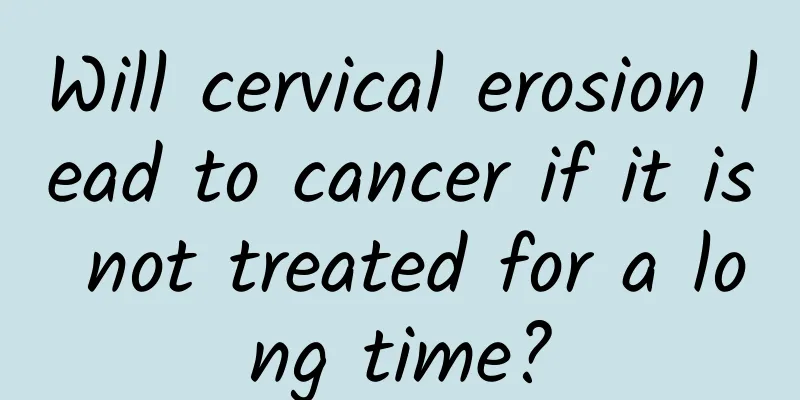Will cervical erosion lead to cancer if it is not treated for a long time?

|
Long-term untreated cervical erosion may increase the risk of cervical cancer, but it does not directly cause cancer. Cervical erosion is a common gynecological phenomenon, usually related to changes in hormone levels, infection or inflammation. If left untreated for a long time, it may cause chronic inflammation, increase the risk of abnormal cervical cell proliferation, and may develop into cervical cancer. 1. Causes of cervical erosion Cervical erosion is mainly related to the following factors: First, changes in hormone levels, such as increased estrogen levels may cause the outward migration of the cervical columnar epithelium; second, infection, such as human papillomavirus (HPV) infection, bacterial or fungal infection; third, chronic inflammation, such as long-term unhealed cervicitis; fourth, mechanical stimulation, such as frequent sexual intercourse or childbirth injuries. 2. Treatment of cervical erosion Treatments for cervical erosion include medication, physical therapy, and surgery. Medication can use antibiotics such as metronidazole, antifungal drugs such as fluconazole, or antiviral drugs such as interferon. Physical therapy includes laser therapy, cryotherapy, and microwave therapy, which promote the regeneration of healthy tissue by destroying abnormal tissue. Surgical treatment is suitable for severe cases, such as cervical conization or LEEP knife surgery. 3. Measures to prevent cervical cancer The key to preventing cervical cancer is regular screening and early intervention. It is recommended that women undergo cervical cytology TCT and HPV testing once a year to detect abnormalities in a timely manner. HPV vaccination can effectively prevent high-risk HPV infection. Maintaining good living habits, such as quitting smoking, eating a balanced diet, and exercising moderately, can help enhance immunity and reduce the risk of disease. Cervical erosion itself is not cancer, but long-term untreated may increase the risk of cervical cancer. Timely treatment and regular screening can effectively reduce the incidence of cervical cancer. Women should pay attention to gynecological health and take active preventive measures to ensure early detection and treatment of potential problems. |
<<: How to treat functional uterine bleeding
>>: What causes functional uterine bleeding and how to treat it
Recommend
Can endometrial tuberculosis be transmitted to sexual partners?
As we all know, uterine disease is a very common ...
Do you have to starve to lose weight? 9 low-calorie foods including konjac and oatmeal to help you lose weight
Who says you have to starve to lose weight? Eatin...
What are the reasons for frequent recurrence of vaginitis?
The main symptoms of vaginitis are increased foam...
What is the effect of abortion on menstruation? How to treat the symptoms of amenorrhea after abortion?
In life, abortion is a last resort remedial measu...
How to treat cervical warts
Cervical warts are also particularly serious gyne...
What should be done to check for chronic cervicitis
Examination of the uterine cavity can detect cerv...
What are the treatments for ovarian cysts?
Ovarian cysts are a common gynecological disease,...
What are the symptoms of uterine fibroids? Don't ignore the five symptoms of uterine fibroids
What are the symptoms of uterine fibroids? (1) In...
7 great warming foods! Speed up metabolism and help lose weight
Did you know? To successfully lose weight, in add...
What are the obvious symptoms of ovarian cysts?
During a gynecological examination, many people w...
Women should take good contraceptive measures to prevent cervicitis
It is good for women's health to prevent cerv...
What is the normal age for women to go through menopause?
It is a normal physiological phenomenon for women...
Want to be slim and light 10 easy steps
Many people want to lose weight quickly, but they...
What are the effects of vaginitis on women's bodies?
Vaginitis is a common disease, and most women do ...
Can I get pregnant if I have an ovarian cyst? What are the specific symptoms?
Can you get pregnant with ovarian cysts? What are...









